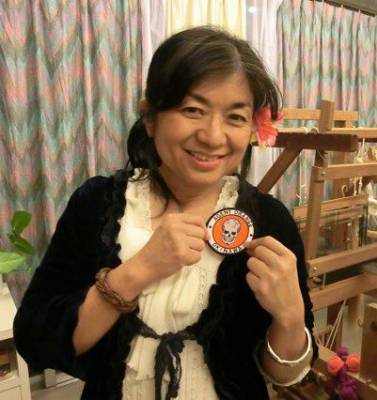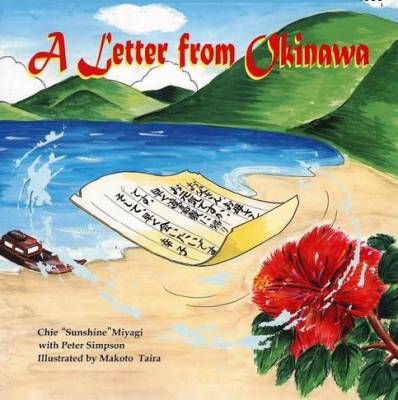
Chie Miyagi is a high school teacher in Okinawa and a member of the Board of Directors of the Okinawa Historical Film Society. She is a representative of Treasures of Ryukyu, a singer-songwriter and author of a picture book 'A Letter from Okinawa' and the Okinawan song of Tida nu fa (Children of the Sun). Her research inclues peace education, Ryukyu independence, and the Student Corps of Okinawa during the Battle of Okinawa.
Twist in Okinawa mass suicides tale
Teacher based book about civilians ordered to kill themselves on own family tragedy
by Mie Sakamoto
HAEBARU, Okinawa Pref. – Chie Miyagi, an English teacher in Okinawa, has published an English-language picture book to teach her students about the mass suicides involving local civilians during the 1945 Battle of Okinawa.
“A Letter from Okinawa” depicts a girl whose parents kill themselves under orders from the Japanese military on Tokashiki, one of the Kerama Islands. The girl lives separately from them on Okinawa’s main island, where she has been drafted into the nurse corps.
The girl, Sachiko, sends a letter to her parents after surviving the war but never receives a reply. She later finds out that her parents died in March 1945 in a mass suicide.
At the end of the story, it is revealed that Sachiko is Miyagi’s mother and that the story is based on her mother’s life.
Earlier this month, in her class at Haebaru High School on Haebaru, Okinawa, Miyagi, 49, read the book to her 35 students and had them draw pictures of war and write a letter to their parents in English, imagining they were Sachiko.
The English teacher also told them to learn as much about the war as they could from the experiences of their grandparents.
“It is hard to imagine the mass suicides, as there is no way I can see them in pictures or other means. It is important to convey what happened in the past,” said Daiki Shiroma, 17, one of the students.
Okinawa was the only inhabited part of Japan where ground fighting took place during World War II, claiming the lives of a quarter of its civilian population. More than 200,000 Japanese and Americans died during the battle.
Many survivors say that as Japan neared the brink of defeat, Japanese soldiers ordered civilians to kill themselves and their loved ones, though some deny the claim.
Although there are no specific figures, about 600 people are said to have died in mass suicides.
The issue drew public attention again last year after the Education, Culture, Sports, Science and Technology Ministry’s school textbook authorization council instructed history textbook publishers to play down the Japanese military’s role in the civilian mass suicides.
Following a major September protest rally in Okinawa, the council approved requests by history textbook publishers to effectively reinstate references to the Japanese military’s role.
But the council did not retract its opinion that the textbook references to the forced mass suicides could cause misunderstanding.
“The number of deaths (in mass suicides) may not be as big as other war dead” from the atomic bombings of Hiroshima and Nagasaki or the Holocaust, Miyagi said. “But it is very cruel that families killed themselves to end their lives. I’d like people to know that the war caused such tragedies.”
Miyagi first knew the truth about the death of her grandparents, Jitsui Makiya and Nae, when she saw a monument with their names engraved on it on Tokashiki Island about 20 years ago.
Until then, she did not exactly know how her grandparents had died because her mother, Sachiko, 80, was reluctant to talk about her wartime experiences, as are many survivors.
“My grandfather served as a school principal and later as village mayor on Tokashiki. He must have loved Tokashiki and wanted to live,” Miyagi said. “My mother must have been very shocked because her parents were telling her to come back to the island, saying it was safe there.”
Her mother said she herself was taught by a Japanese soldier how to die using a grenade by making sure she exploded it next to her heart so she would die instantly.
Her mother said she appreciates the fact that her daughter has written the book.
“If Chie had not written about my parents, no one would know how they ended their lives and they would have died in vain,” her mother said. “But if there had been no war at all, they would not have died in such a way.”
Peter Simpson, 43, an associate professor at Okinawa International University who helped Miyagi write the book, said he was “really moved” when he heard the story of her grandparents in May 2005.
“My knowledge of Okinawa was quite limited” before coming to the prefecture in 1998, Simpson said.
He said his image of the mass suicides was that only a small number of people decided to commit suicide as they believed it was better to die than to be captured by the Americans, or that Japanese soldiers would commit suicide rather than civilians.
“It’s not something that many people know about outside Japan. People know more about the Nanjing Massacre and about the ‘comfort women’ (wartime sex slaves) issue, but most people don’t know about these forced suicides,” Simpson said.
“In Okinawa, the memory of the war, especially among young people, is fading. Even the antiwar kind of culture is under threat. . . . So this story is an important one to tell,” he added.
The idea for the picture book came during Miyagi’s 2002-2004 stay in Northern Ireland and Hungary to study English teaching. In the two countries, she showed students a picture-story show about the mass murders and suicides on Okinawa.
“When I told the story about mass suicides and revealed that Sachiko is my mother, the students were shocked,” Miyagi said. “And they simply felt lost (after knowing that family members had killed each other).”
It is beyond her imagination that people were driven to kill their loved ones, Miyagi said, and she still questions why this happened.
On the other hand, she thinks it is a miracle that she came into the world at all and is still alive now.
“It is miraculous that my mother, who lost her parents and many of her friends, met my father, who also survived the war, and had me,” Miyagi said. “I want everyone to realize that life is the product of a miracle.”
“A Letter from Okinawa,” published last November, has an accompanying Japanese translation and is available for ¥700, including tax. For further information, phone Okinawa Jiji Publishing Co. at (098) 854-1622.








